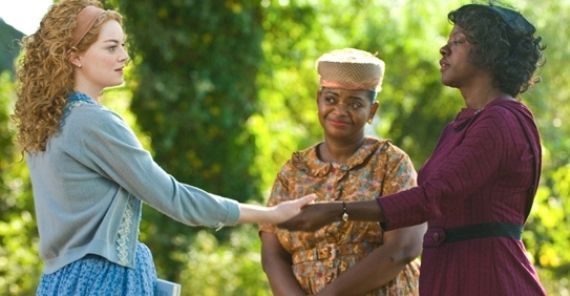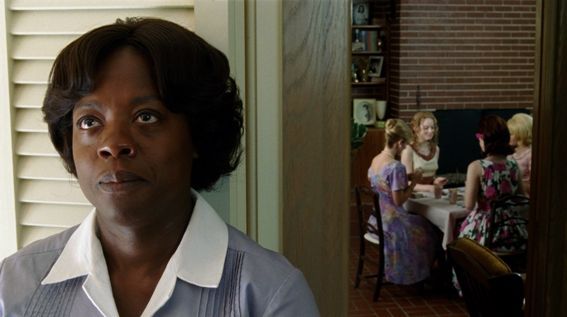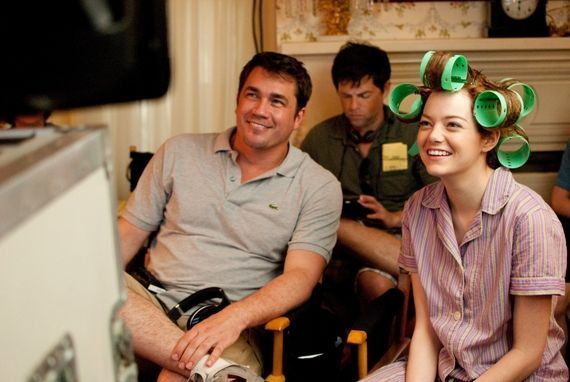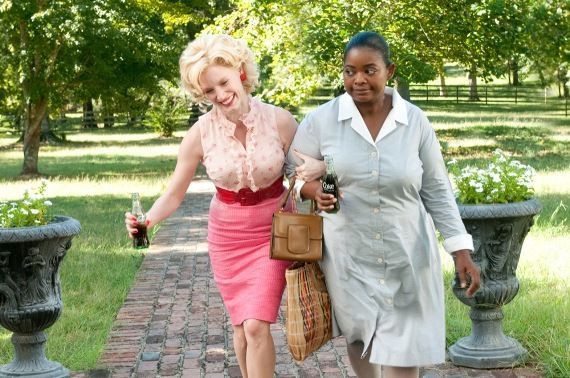The Help, one of the first thoughtful and emotionally-evocative dramas in a summer jam packed with explosive event film offerings, is now in theaters. Adapted from the bestselling novel by Kathryn Stockett, the film stars Emma Stone, Bryce Dallas Howard, Viola Davis, Octavia Spencer, Jessica Chastain, Allison Janney, and Sissy Spacek.
Set in Jackson, Mississippi amidst the racial turbulence of the 1960s The Help takes a look at the more intimate social politics of the time - rather than the broad societal conditions. It explores, as novelist Kathryn Stockett says, “How it all worked out in the kitchen.”
The film follows the story of four women that (each in their own way) are living at the edges of the popularly accepted Southern culture of the time. Skeeter, who is striving for a career as a journalist at a moment in history when marriage and babies were the markers of a woman’s worth, Celia a woman judged by the poverty of her youth and her inherently uninhibited sexuality, as well as Aibileen and Minny -- two of the maids who silently worked and lived in an existence that seemed pre-ordained for them.
Eugenia 'Skeeter' Phelan (Stone) is a young woman who just returned from College and is given her first foot in the door as a journalist – a domestic column for the local newspaper. Being less than inclined toward the domestic arts, she seeks the advice of her best friend’s maid, Aibileen (Davis). Skeeter soon shifts her focus from collecting housekeeping tips to investigating the lives of the women that support and enable the lives of wealthy Southern families that she grew up with – The Help. The African American maids that raise the children, and make the sweet ambrosia for bridge parties, but often lived either as specters at the edges of their employers lives, or (by the worst of the employers) as tolerated (but necessary) evils.
A few weeks ago we had the opportunity to sit down in roundtable interviews with novelist Kathryn Stockett, director Tate Taylor, songwriter Mary J. bilge (who wrote an original song for the film) and the cast of The Help - to talk about working on a movie that was in many ways a family affair, the pleasure of bringing these rich characters to life, and looking back at a time, a place and a culture that holds painful collective memories.
Memories of a history that, as Emma Stone points out, many people still know very little about today:
"I don't know if it's my generation or if it's just me, but I didn't know the levels, the depths, the intricacies. I didn't know on a day to day basis what life was like [then]. I learned a huge amount of it through this story (even though it's fictional) and through researching the time period more, but I really hope for my generation that they will go see this movie because I don't know that we know as much as we should about our very recent history."
The Help: A Family Affair
Even before Kathryn Stockett's novel was released an intimate, or as director Tate Taylor calls it, "incestuous" web of connections began to form to make the movie possible.
Childhood friends Taylor and Stockett grew up together in the Jackson, Mississippi that serves as the backdrop for both the novel and the film, The Help (thought they grew up several years after this story takes place). Stockett, a woman who has little interest in Hollywood and confesses that the last movie she has seen in the theater is Seabiscuit, was not driven by the prospect of making a film -- she was writing a novel.
Her friend and budding director, Tate Taylor, on the other hand would read the manuscript as it was being written and knew the book had potential to make a wonderful movie. He also knew that he had to be the one to make it. It took some convincing, but he eventually convinced Stockett that he was the man for the job, and to give the rights to him.
As Stockett explains it:
"The thing that really kind of broke me, and it wasn’t like a huge argument that we had about whether he would make the movie. What really got under my skin was he said, ‘Katy if you don’t give me the rights to The Help some kind of Hollywood type or," the author continued teasingly, "I mean God knows like a Canadian might get them and chances are they will try to make this movie, and they’ll get scared and it will sit on the shelf and it’ll never be made.’ And I think you (Taylor) were right cause’ you pushed through a lot of walls to get it made."
"I may have been trying to scare you a bit" Taylor laughingly confessed to Stockett. "But I’ve just been out here and you hear of these great projects…I think of 'The Secret History' that’s one you had always talked about. That’s one that, as you know, they put expensive writers on and then people don’t like it and then they bring on another expensive writer and all these people get involved and gets whittled and ugh. I just didn’t want that to happen."
The history that Taylor and Stockett share is a reflection of the very stories that each were bringing to the world with both the novel, The Help, as well as its cinematic adaptation.
"Both of our moms were divorced," Stockett explained.
"Our moms were Celia’s," Taylor continued. "Honestly they were not accepted in Jackson society at all. We both saw the pain that it caused them."
Celia, the character that actress Jessica Chastain brings so vividly to life in this film, is a Marilyn Monroe-esque woman from poverty stricken Sugar Ditch, Tennessee. A vibrant, life-loving (if somewhat inappropriate) woman who is outcast by the Jackson society ladies in the film - who are threatened by what Chastain describes as her "innocent sensuality" and "color-blind" point of view. Color blind due to the unique nature of her integrated upbringing in Sugar Ditch -- where everyone was equally poor.
Stockett explained that as the children of single working mothers, "the woman that we would come home to was the black woman that was working for our moms because our moms were working in an office."
Taylor continued, saying, "It was a different dynamic because my mom and Carol, the woman that raised me (who’s also in the movie - when Aibileen comes into the church and says, ‘who are we clapping for?’ and the woman says; ‘They’re clapping for you’ that’s the woman that raised me) she and my mom had a really great relationship, I mean they…"
"That was more of a partnership," Stockett interjected.
"Yeah," Taylor contained, "but that was like Celia and Minny. My mom was a single mom trying to support me being a real estate agent and three months went by and she had not sold anything. Luckily I was at that age where franks and beans is gourmet so she just kept opening up the cans. But she had Carol. Carol was a single mom with three kids and it was really cool because Carol would take care of me and sometimes mom would take care of Carol’s kids. They would come spend the night with us one weekend. So it was different. It was the South and the African American care-giver but more of the Celia/Minny relationship. So what spoke to me in the book was that bond between like Mae Mobley (the three year-old white child Aibileen cares for) and Aibileen. As well as that going against the grain relationship (of Minny and Celia) – which is still against the grain – a black woman and a white woman being friends in the ‘70s and just taking care of each other."
"It was much more of a hierarchy," Stockett revealed of her own upbringing.
"After school I went to my grandmother’s house and it was her maid Demetry and my grandmother grew up in Shanghai. So she’s American but she understood class and enunciation and that the maid did this and that she was the woman of the house. So that was a different dynamic. But still, we just, you know, we came home to that face and those arms around us."
Understanding the confusing weave of the bonds and distrust between these caregivers and their employers is at the center of the stories told in The Help.
Stay tuned for part two of our coverage of The Help which addresses art imitating life in casting as well as what the cast and creators had to say about shedding light onto the South's painful past.
The Help opens in theaters today, August 10th.
Follow me on twitter @jrothc




